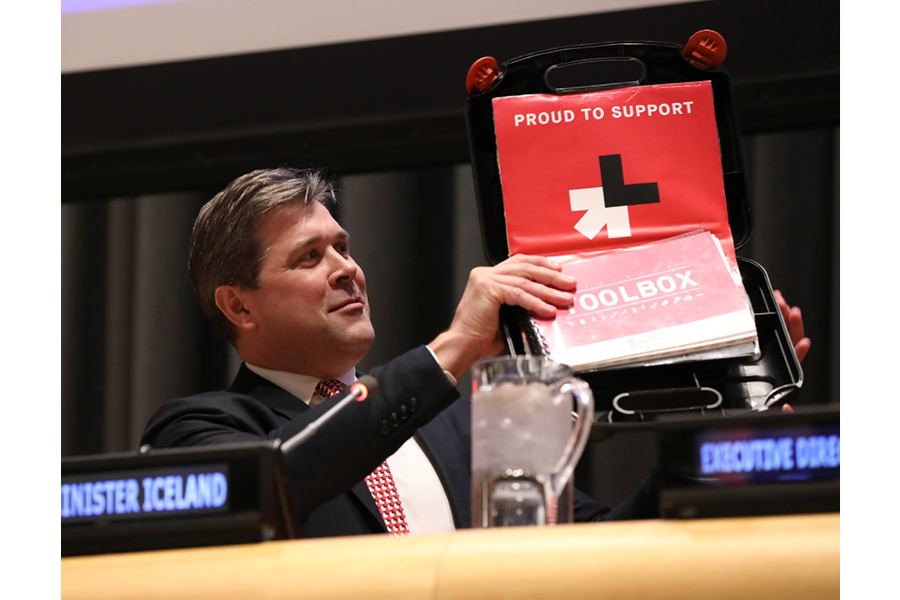 |
| Prime Minister of Iceland Bjarni Benediktsson speaks during an observance of the International Women’s Day 2017 at the United Nations in New York, on March 8, 2017. (Shannon Stapleton/Reuters) |
The Icelandic government will introduce legislation this month that requires employers to prove equal pay for equal work.
MARCH 9, 2017 —As women around the world marked International Women’s Day on Wednesday with marches, speeches, and protests, Iceland is determined to channel that spirit into concrete gains.
The island nation plans to roll out an ambitious proposal to close the wage gap.
Iceland's government announced on Wednesday it will introduce legislation in the country’s Parliament this month that will require any employer with 25 workers or more to obtain certification that it pays men and women equally for work of equal value.
"Equal rights are human rights," said the country’s Equality and Social Affairs Minister Thorsteinn Viglundsson. "We need to make sure that men and women enjoy equal opportunity in the workplace. It is our responsibility to take every measure to achieve that."
The proposal would scale up similar equal-pay certification laws implemented elsewhere, but that have yielded limited progress on closing the wage gap.
Since 1994, Switzerland’s Federal Act on Public Procurement has required any firm with a government procurement contract to prove that it offers equal pay. Upon receiving a contract, the firm must submit to an audit of its wage records. If the findings show a wage discrepancy of more than five percent between men and women, and the business can’t provide a suitable explanation, it must fill the wage gap or risk losing its contract.
Under a separate 1995 law, Switzerland also maintains a voluntary program for businesses to undertake similar audits and obtain an “equal-salary” certification.
Policies like these are catching on elsewhere. In 2014, Minnesota Gov. Mark Dayton signed the Women’s Economic Security Act (WESA) into law. Among other provisions, the law requires firms that have 40 employees or more seeking state contracts of at least $500,000 to “ensure and state compliance with equal pay laws.”
WESA hasn’t had much time to take effect, but Switzerland’s two-decade experiment with equal-pay certification hasn’t been enough to close the wage gap. In 2015, Eurostat, Europe's statistical arm, reported that Swiss women earn an average of 19.3 percent less than their male counterparts for doing equal work, above the EU average in 2013 of 16.4 percent. And according to Switzerland’s Federal Statistical Office, the country’s gap actually increased 0.5 percent between 2010 and 2012.
While statistics on the wage gap can vary, Swiss labor and gender-equality advocates think that their country can do better. In particular, they think verification systems need more teeth. After a 2009 plan to promote greater cross-checking of wages yielded dismal results, the project’s director, Luzius Mader told Swissinfo that “If we conclude that the voluntary approach is not satisfactory, we have to create the foundations for more coercive measures.”
Iceland seems to be thinking along those lines as it prepares to make certification mandatory for all but the country’s smallest employers.
Mr. Viglundsson acknowledged that "it is a burden to put on companies to have to comply with a law like this," but sees it every bit as important as the annual audits and tax reports that companies are already likely to complete.
And in the nation that already ranks first in the world for gender equality, with a 14-to-18-percent wage gap, the bill already enjoys widespread support in Parliament as a possible means to shrink that gap to zero.
As Viglundsson puts it, "The time is right to do something radical about this issue."
This report contains material from the Associated Press.
Permission to use this
material was granted by
Page created on 3/10/2017 12:43:10 PM
Last edited 3/10/2017 12:43:10 PM

